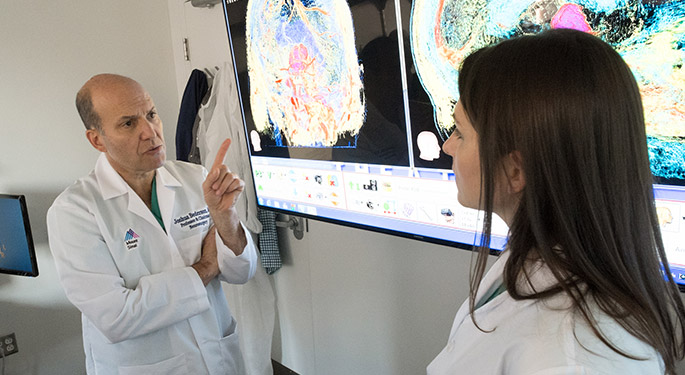About Our Brain Tumor Experts

Mount Sinai provides the full spectrum of care, regardless of the type of primary and secondary brain tumor you have. We often treat glioblastomas, low-grade gliomas, and metastatic brain tumors. We aim to improve your quality of life through personalized care plans.
Treatments We Offer
Using advanced diagnostic tools, our multidisciplinary team of neurologists, oncologists, radiation oncologists, and neurosurgeons works together to recommend individualized treatment plans, which may include one or more of the following:
- Endoscopic brain surgery is a minimally invasive approach to tumor removal.
- Chemotherapy ismedication used to kill cancer cells.
- Craniotomy is the surgical removal of a portion of the skull to resect brain tumors.
- Radiation therapy is use of high-energy beams to destroy cancer cells
We have pioneered and mastered complex technologies to treat these tumors aggressively. For instance, we use intraoperative monitoring, including brain mapping, to identify vital areas of the brain and avoid them during surgery for safe tumor removal. Our surgeons also perform routine brain monitoring during surgical procedures to protect neurological function.
In addition, we provide support services including physical and occupational therapy, social workers, and support groups. We also have palliative care and a specialized neuro-intensive care unit should they become appropriate at any point. Our goal is to improve your quality of life and to prolong your survival.
When you call for an appointment, please have available the name of the patient, age, diagnosis, and any prior treatments. For your first appointment, please bring any magnetic resonance imaging or computed tomography scans.
Research and Clinical Trials
Mount Sinai has made significant advances in neuro-oncology research. We were the first investigators in New York to use the adenovirus to kill tumor cells in patients with glioblastomas and to identify embryonic stem cells that could be used in gene therapy. We were also the first to perform 5-ALA fluorescence-guided surgery for removal of a brain tumor.
Our goal is to move translational research from the bench to the bedside in patients with high-grade tumors. As a result of our research efforts, our patients have access to new therapies through these ongoing clinical trials.
Weekly Brain Tumor Board
To provide a cohesive review of each patient's needs, doctors in all applicable specialties meet every week to review the management of brain tumor patients. If you would like us to review your case, please ask your neurosurgeon, neuro-oncologist, or radiation oncologist to submit your case.